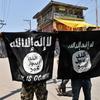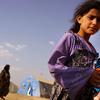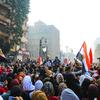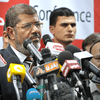Fawaz Gerges appears in the following:
'ISIS Needs to be Denied Theological Oxygen'
Wednesday, April 06, 2016
ISIS Propaganda, Now Available in English
Thursday, April 09, 2015
Israel Arrests Suspects in Revenge Killing of Palestinian Teen
Monday, July 07, 2014
The Caliphate, Then and Now
Thursday, July 03, 2014
ISIS, the Islamic State of Iraq and Syria, claims to have set up a caliphate and wants to be referred to as "the Islamic State". Fawaz Gerges, chair of Contemporary Middle Eastern Studies and professor of International Relations at the London School of Economics and author of The New Middle East: Protest and Revolution in the Arab World (Cambridge University Press, 2013) talks about the history of the caliphate - both imagined and real - and why ISIS is trying to establish one (and if they've succeeded).
Today's Highlights | April 28, 2014
Monday, April 28, 2014
On Today's Show: The U.S. has announced a new round of sanctions against Russia..A look at the Palestinian unity agreement and discusses the future of the peace process.
Egypt, Islamism, and Democracy
Tuesday, July 09, 2013
In another bloody day in Egypt, over 50 pro-Morsi Islamist protesters were killed by military forces. Meanwhile, the interim leader laid out a political transition plan. Fawaz Gerges, director of the Middle East Centre at the London School of Economics and author of Obama and the Middle East: The End of America's Moment?, discusses the recent events in Egypt, and how the Islamist world is reacting.
Violence in Sinai and Morsi's Reaction
Wednesday, August 15, 2012
Fawaz Gerges, director of the Middle East Centre at the London School of Economics and author of Obama and the Middle East: The End of America's Moment?, talks about the recent violence in Sinai and its effect on Egyptian politics.
Fawaz Gerges on the Latest from Syria
Friday, June 01, 2012
Fawaz Gerges on Whether War is Inevitable
Thursday, May 24, 2012
Fawaz Gerges, professor of Middle Eastern Politics and International Relations at the London School of Economics, came to WNYC to talk about his new book Obama and the Middle East: The End of America's Moment?. While he was here, he answered the End of War question: Is war inevitable?
Fawaz Gerges on the Rise and Fall of Al-Qaeda
Friday, September 16, 2011
Fawaz Gerges gives a history of al-Qaeda, showing its emergence from the disintegrating local jihadist movements of the mid-1990s-not just the Afghan resistance of the 1980s. In The Rise and Fall of Al-Qaeda, he reveals that transnational jihad has attracted only a small minority within the Arab world and possesses no viable social and popular base. He also describes how the democratic revolutions that swept the Middle East in early 2011 show that al-Qaeda has no influence over Arabs' political life. Gerges argues that the West has become trapped in a "terrorism narrative," but that Al-Qaeda is no longer a serious threat.
Decade 9/11: Lawrence Wright and Fawaz Gerges
Friday, September 09, 2011
Backstory: Continuing Unrest in Yemen
Thursday, August 18, 2011
As a brutal crackdown on protesters continues in Syria, the unrest in Yemen has slipped from the headlines. On today’s Backstory, Fawaz Gerges, a professor of Middle Eastern Politics and International Relations at the London School of Economics, describes what’s happened in the drought-stricken, poor country over the last few weeks, including the formation of a national council by those opposed to President Ali Abdullah Saleh.
Unrest in Yemen Leading Toward Civil War?
Monday, March 21, 2011
"I think, I really fear, that the countdown to civil war in Yemen has just begun. It’s not just about protests in Yemen. You have some major defections by army generals in the last 24 hours. You have internal divisions within the ruling party of Pres. Ali Abdullah Saleh. Some elements from his own tribe are calling for him to step down. You have now a military standoff between special forces led by his son and the first division of the army of which the generals, some of his closest generals, have defected. You have turmoil engulfing most of the Yemen. You have a separatist movement in the South; you have a tribal insurgency in the North. But most important of all, I would argue, the new democratic revolt that has been sweeping the Arab world has reached Yemen with a vengeance."
Fawaz Gerges, professor of Middle Eastern Politics and International Relations at the London School of Economics. For more of the interview, click here.
The Continuing Protests Across the Middle East
Monday, March 21, 2011
The protests in Yemen and Bahrain have turned violent over the past week. Fawaz Gerges, professor of Middle Eastern Politics and International Relations at the London School of Economics, and Mustapha K. Al-Sayyid, professor of political science at The American University in Cairo and director of the Center for the Study of Developing Countries at Cairo University, describe the government reaction to the protests, how other governments in the region are reacting to the unrest, and where the protest movements go from here.
How the Protests in Egypt Are Helping Break Down Sectarian Barriers
Thursday, February 10, 2011
“In fact, many Egyptians believe that the security apparatus played a key role in fueling sectarian tensions because that played into its hands. And the reality – I’m not saying there were no tensions - but the scenes in the Liberation, the Tahrir, Square really show very clearly that Egyptians are finally getting to know one another and this is really one of the most important lessons of what has happened in Egypt.”
-- Fawaz Gerges, professor of Middle Eastern Politics and International Relations at the London School of Economics. You can hear his whole conversation with Leonard about the many different roles of mosques in the protests in Egypt here.
Mosques and the Protests in Egypt
Wednesday, February 09, 2011
Social media sites helped organize the protests in Egypt, but mosques have served many functions—from becoming makeshift hospitals to turning out large crowds of protesters each Friday. Fawaz Gerges, Professor of Middle Eastern Politics and International Relations at the London School of Economics, describes the many roles that mosques have played during the protests across the region, from Egypt to Yemen to Jordan.
What is the Muslim Brotherhood?
Thursday, February 03, 2011
Fawaz Gerges, Director of the Middle East Centre and Professor of Middle Eastern Politics and International Relations at the London School of Economics discusses the history of the Muslim Brotherhood and its relationship to the ongoing protests in Egypt.
→ Read a Recap and Join the Conversation at It's A Free Country



